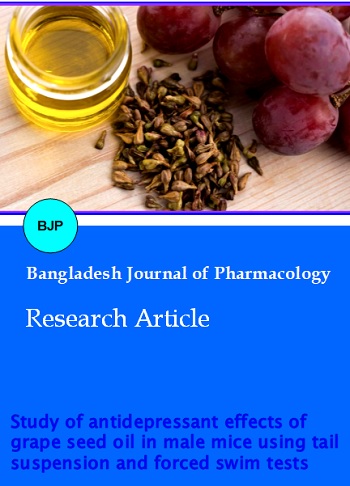Study of antidepressant effects of grape seed oil in male mice using tail suspension and forced swim tests
DOI:
https://doi.org/10.3329/bjp.v12i4.33520Keywords:
Antidepressant, Forced swim test, Grape seed oil, Mouse, Tail suspension testAbstract
The aim of this study was to investigate the antidepressant effects of grape seed oil in male mice (n=60) using tail suspension and forced swim tests. Mice were divided to six groups of 10 in each group. Group I: Intraperitoneally receiving normal saline; Group II: Received normal saline & stress; Group III-V: Injected (i.p.) with different (60, 120, and 240 mg/kg) doses of grape seed oil; and Group VI: Received fluoxetine (10 mg/kg). Grape seed oil in 60 mg/kg significantly decreased immobility time in tail suspension and forced swim tests under chronic unpredictable stress compared to groups under chronic stress receiving normal saline and grape seed oil (120 and 240 mg/kg). Grape seed oil (60 mg/kg) significantly improved the motor balance in mice under chronic stress. It had no significant effect on serum corticosterone level. Grape seed oil can improve depression symptoms in mice.
Video Clip of Methodology:
0 min 14 sec Click to watch
Downloads
256
196 Read
84

Published
How to Cite
Issue
Section
License
Authors who publish with this journal agree to the following terms:
- Authors retain copyright and grant the journal right of first publication with the work simultaneously licensed under a Creative Commons Attribution License that allows others to share the work with an acknowledgement of the work's authorship and initial publication in this journal.
- Authors are able to enter into separate, additional contractual arrangements for the non-exclusive distribution of the journal's published version of the work (e.g., post it to an institutional repository or publish it in a book), with an acknowledgement of its initial publication in this journal.
- Authors are permitted and encouraged to post their work online (e.g., in institutional repositories or on their website) prior to and during the submission process, as it can lead to productive exchanges, as well as earlier and greater citation of published work (See The Effect of Open Access).
